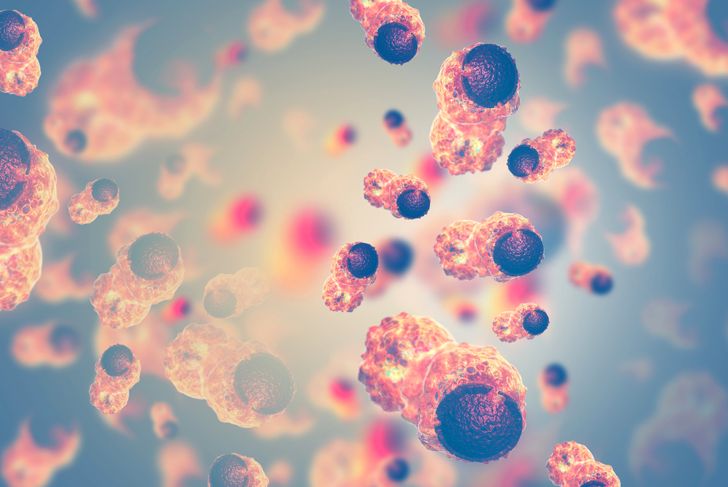Mesenteric adenitis affects the lymph nodes in the abdomen, and they become inflamed. The leading cause is an infection, though there are other, rarer causes, such as cancer or bacterial conditions. Teenagers and children are most often affected, and while symptoms tend to clear up on their own, some cases require antibiotics and other treatments, including surgery. Mesenteric adenitis can cause a variety of symptoms.
Abdominal Pain
The most notorious symptom of mesenteric adenitis is abdominal pain. Because this condition causes the lymph nodes in the abdomen to become inflamed, pain is most often felt around this area. Even though the exact location of the discomfort is difficult to pinpoint, the lower right side is often the most vulnerable region. Some people experience pain in only a particular part of the abdomen, whereas others feel pain across the whole stomach. You should call your doctor as soon as possible if you notice severe pain suddenly, or pain that is accompanied by fever.
Tenderness
Another possible symptom of mesenteric adenitis is tenderness in the abdominal region which may extend to the top of the legs. Sensitivity is a symptom that frequently accompanies abdominal pain and discomfort. Tenderness can occur on different levels, ranging from mild to severe. The most common cause of tenderness is the inflammation or irritation of the abdominal cavity. In this case, swollen lymph nodes may also be a cause of tenderness. Even though this condition usually resolves on its own, it is always a good idea to get a check-up to make sure no permanent damage has occurred.
Fever
In some cases, your body may respond to an infection by increasing body temperature, thus causing a fever to occur. Fevers are the first line of defense against infections because they help to eradicate infections naturally. The lymph nodes can also become infected. Moreover, lymph nodes are a crucial part of the immune defenses because they are spread across the body and help to fight off illness. When they become infected, they might appear swollen and inflamed. Besides the abdomen, there are also lymph nodes in the neck and the groin.
Diarrhea
Diarrhea may be present in patients affected by mesenteric adenitis. The most apparent cause of diarrhea is a viral or bacterial infection that affects the stomach, such as gastroenteritis; food poisoning is also a common cause. Diarrhea can be challenging to manage due to the loss of water content from the stomach. That’s why it is essential to drink water consistently. Moreover, consume bland starchy foods such as crackers or white bread, which are more easily digested. If your diarrhea is accompanied by more serious symptoms such as fever or severe pain, contact your doctor right away.Causes
Viral Infection
Among the most important causes of mesenteric adenitis is a viral infection. Many viral conditions – including the dreaded stomach flu – can cause symptoms. When foreign viruses enter the body and reach the lymphatic system, they can become infected. In this case, the lymph nodes located along the intestine and the back of the abdominal wall experience inflammation. There are a large number of viruses that can cause this condition. That’s why each treatment depends on the type of infection as well as its severity. In most cases, rest and plenty of hydration are enough, but in other cases, antibiotics may be needed.
Bacterial Infection
Another frequent cause of swollen lymph nodes in the abdominal region is a bacterial infection. Germs can cause the lymph nodes to become inflamed and swollen. Bacterial infections can often affect the intestines, but they are much rarer than viral infections. If the onset is rapid, then the symptoms can also be more severe. Some of the first signs of bacterial infection include fever as well as abdominal pain. To determine the cause of your infection, your doctor will run a series of tests including a CT scan to identify the affected lymph nodes.
Cancer
A more unusual cause of inflamed lymph nodes along the abdomen is cancer. Cancer is one of the rarest causes of this condition. Many types of cancer may trigger swollen lymph nodes. These include, for example, lymphoma. Other common cancers include breast cancer as well as lung cancer and especially gastrointestinal cancer. Cancerous cells can quickly spread through the body, thus causing the onset of symptoms. Mesenteric lymphadenitis may cause both local and systemic symptoms, depending on the location of the infection. Your doctor will likely issue a full blood count to analyze your condition.
Painkillers
For mild to moderate symptoms, painkillers are often the way to go. Over the counter painkillers are especially useful in treating discomfort and abdominal pain. Other over the counter medication may be beneficial, such as loperamide which targets diarrhea. You should only use medicines if symptoms are present. However, you shouldn’t take any medication without consulting your doctor first, and be sure not to give aspirin for children under the age of 3. Your pharmacist can also provide you with information about different treatment options. If symptoms persist, contact your doctor.
Antibiotics
Antibiotics are often given to treat the cause of this condition. However, antibiotic usage is restricted to more severe cases, so be sure to check with your doctor if antibiotics are right for you. After taking the medication for the correct amount of time – usually taken before or after a meal – symptoms gradually begin to disappear. It’s important to start treatment as soon as possible; if not, the condition can women, possibly developing into a life-threatening infection of the blood. This can happen if the bacteria finds its way into the bloodstream.
Rest
It may sound surprising, but one of the best ways to cure mesenteric lymphadenitis is by getting plenty of rest. Rest can help the body to regain the energy it needs to fight off harmful bacteria and restore balance. However, your symptoms probably won’t go away instantly. That’s why, in some instances, you can continue to use prescription or over the counter medication to help alleviate symptoms. If you notice intense pain, fever, or diarrhea, contact your doctor. Besides rest, remember to drink plenty of water to stay hydrated. Heat may be applied to help reduce pain.

 Home
Home Health
Health Diet & Nutrition
Diet & Nutrition Living Well
Living Well More
More




















